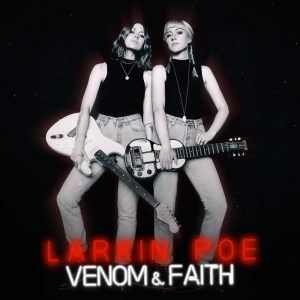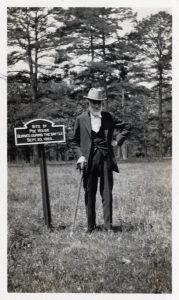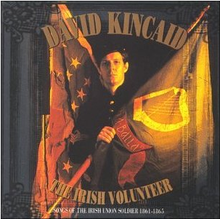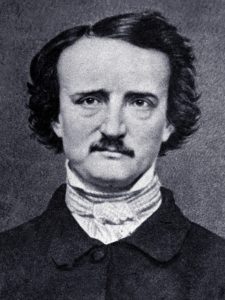CW & Pop Culture: Civil War Rock and Roll, or, Who was Larkin Poe?
When it comes to the Civil War and popular culture, I admit I am hard to please. For example, with a couple of notable exceptions, I am generally disappointed by film portrayals of the American Civil War. Even the ones I like I find periodically a little to “Hollywood” for my tastes. I doubt there will ever be a Civil War movie that rings all my bells.
And yes, I am familiar with the various period music efforts and musicians, ranging from Johnny Horton to the 97th Regimental String Band and David Kincaid (above) who recorded the first of his two solo albums of period music – “The Irish Volunteer” – back in 1998. I’m also familiar with Kincaid’s guitar-rock efforts via his band, the Brandos, with which he periodically dipped into Civil War territory: the song “Gettysburg” was included on their 1987 album Honor Among Thieves.
Perhaps the most curious of these pieces was Waylon Jennings’ foray into the field of Civil War music with the White Mansions album of 1978 – sort of a storytelling piece with several narrators, each voiced by a prominent country music star, giving us the Cliff Notes version of the war. I had that one too, though I confess I have not heard it in many years, and barely recall any of the tracks.
It’s not that I don’t like those artists. I do. I own (or owned) many of those albums and listened to them every so often. When I spent my time reenacting, that sort of music was the sort of thing reenactors were expected to like, so we did – even if we cranked up punk, new wave, country, or classic rock when we took off the wool.
But I confess I also always found all those recordings a bit too, . . . well . . . earnest, for want of a better term. The soundtrack to the movie The Long Riders was more to my liking; I played it often for about a decade; but let’s face it, as evocative a sound Ry Cooder could wring from a set of strings, that wasn’t really “Civil War” music, or at least it mostly wasn’t. I doubt I am alone in this: even though “Ashokan Farewell” had nothing to do with the Civil War, it has become a theme song for the conflict. It was written in 1982, by folk musician Jay Unger, but that didn’t deter filmmaker Ken Burns from using it extensively in his documentary, The Civil War, which put the tune on the map as perhaps the definitive Civil War sound, like it or not.
Perhaps it is perverse of me that I find what I call “accidental sightings” of civil-war related music more interesting than all those purpose-driven recordings listed above. I was probably 14 or 15 when I first heard the Band playing “The Night They Drove Old Dixie Down.” On first hearing it, I was electrified. (I did not hear the Joan Baez version until much later, even though it was probably more famous.) I even knew who George Stoneman was, at least on a superficial level. Though this song has become one of the group’s bigger hits, one we all still hear often enough on our playlists, Spotify or Pandora, or (quaintly) on our local indie-rock radio stations.
Similarly, I was enthralled by Steve Earle’s tune, “Ben McCulloch,” from the 1995 Train a Comin’ Album. I knew of Steve Earle for things like “Guitar Town” and “Copperhead Road,” not a song about Wilson’s Creek and Pea Ridge. Who saw that a comin’? Not me.
It didn’t hurt (at least for my tastes) that The Band’s and Earle’s works deliver a more cynical, hard-edged, even pessimistic worldview. My sensibility – in music, anyway – has always trended in that direction. These aren’t songs about heroes, or noble sacrifice; just stories of disappointment, disaster and despair. Have a nice day.
Accidental Civil War doesn’t just happen in music, of course. I get a charge out of knowing that North Hooker Street, on Goose Island in Chicago, is not named for (shall we say) extracurricular adult activities but rather Major General Joseph “Fighting Joe” Hooker of Chancellorsville and Lookout Mountain fame. And while most Chicagoans are at least vaguely aware that Sheridan Road is named for Philip Sheridan, almost no one knows that Belmont Avenue celebrates Ulysses S. Grant’s first battle of that name fought in 1861. Alas, neither Sedgwick Avenue in the city or Rosecrans Road, up near the Wisconsin State line have any connection to the Civil War Union Generals of those names; which doesn’t stop me from thinking of them every time I see the signs.
So, you ask, what does any of this have to do with Larkin Poe?
At first glance, nothing. The band Larkin Poe is comprised of two sisters, Megan and Rebecca Lovell, who play pretty wicked blues-driven rock and roll. I think they rock, to get all 1980s on you. They are from Atlanta, and prior to this incarnation, they and a third sister toured as a bluegrass/folk-rock group, aptly named The Lovell Sisters. They also rocked, but in a completely different vein.

However, neither the Lovell Sisters nor Larkin Poe have recorded anything that would leap out at any listener as being Civil War related. For me, that jolt of electric recognition came, not from their music, but from their name.
During the Civil War, Larkin Poe was a teamster with Col. Isaac Avery’s 4th Georgia Cavalry in the Army of Tennessee. Larkin enlisted on June 15, 1862, at Ringgold, initially signing up with Captain A. C. Bradshaw’s independent cavalry company, the Ringgold Rangers, before it was merged into the 4th Cavalry in January of 1863. Prior to joining the Confederate army, he married Sarah Brotherton, who lived with her family alongside the LaFayette Road in Catoosa County. Upon marrying, Poe leased some acreage just north of the Brotherton farm and established a small homestead. In 1863, the Poe and Brotherton farms were smack dab in the middle of what had erupted in to the second-bloodiest battle of the Civil War: Chickamauga.
Poe finally had a chance to visit the site of his farm only the day after the fighting concluded. The entire neighborhood was awash in the dead and dying, both men and animals. It was a holocaust, and it was only with great trepidation that Poe attempted to locate Sarah. Here is his description of the moment:
“The moon was far down the west and cast a ghostly light over the woods and fields. The stillness of the night was unbroken except for the sound of my horse’s hooves and the hoot of some solitary owl. I had seen an old house near Jay’s mill filled with wounded and suffering men, and I had hardly started till I began to see dead soldiers yet unburied, lying in and near the road. I rode on, turning my horse first to the right and then to the left to avoid the thick-strewn bodies. In places I saw where great trees had been splintered by shells and riddled by bullets… Just before reaching the Brotherton house I came upon a scene of death and destruction noteworthy even on that terrible field. I saw a piece of artillery, evidently a Federal piece, which had been knocked from the wheels by a direct hit from our guns, and apparently most all of the horses and men belonging to the gun had perished there for their bodies lay in grotesque heaps around their piece.”
Meeting up with his father-in-law, George, Poe ventured on to his own cabin, which he found burned to the ground. Horribly burned corpses lay in the ashes, though they appeared to be soldiers, not his family. Eventually, Poe discovered that Sarah had refugeed with about 60 other local civilians in the woods and ravines north of Horseshoe Ridge. He could do little to help them beyond leaving them a sack of cornmeal from the army stores he carried. The army was moving on, and Poe had to go with it.
Poe would not serve much longer, however. He was listed as absent without leave in November, 1863, and his name next appears on a roster of “Rebel deserters who have voluntarily taken and subscribed the Oath of Allegiance to the United States Government” sometime between December 4 and 16, 1863. He turned himself in to Union authorities in Knoxville, where after taking that oath, he was released in Hamilton County, Tennessee (Chattanooga.) Perhaps he was a secret Union man – there were plenty of them in North Georgia – who tired of serving the Confederacy, or perhaps the extreme destitution of his family forced him to choose between their needs and military service.

In any case, as evidenced by the photograph, Poe survived the war and reunited with Sarah, but they never returned to live on their leased farm. Poe did at least return to visit many years later, as evidenced by the photograph, above.
So the minute I read that band name, I felt there had to be a connection, especially since the Lovells were from Atlanta. Fortunately, we live in an age where the great and powerful Oz is there to answer all our questions, in the form of internet search engines. As I stumbled from link to link, interview after interview, I soon discovered that the ladies named their band in honor of the great-great-great Grandfather, who was in their words, “a Civil War wagon driver.” He was also, to their obvious delight, a distant cousin of the more famous Edgar Allen Poe. Nice touch of Goth there.
https://americansongwriter.com/2014/10/larkin-poe-family-ties/
So, while Larkin Poe is gone, he is definitely not forgotten. When Larkin Poe appears in Norway or Germany, opens for Bob Seger, plays with Elvis Costello, or headlines at a blues fest; it seems to me that the Chickamauga teamster is there too.

And deep in my heart, I confess that I am enough of a fanboy to hope that someday, one day, when I am standing at the site of Larkin Poe’s cabin, talking about the 4th Michigan Battery or just contemplating the titanic struggle that occurred there in September 20, 1863; I will suddenly hear the hiss of air brakes and look up to see a massive tour bus idling on the LaFayette Road, obscuring the State of Georgia Monument while the Lovell sisters descend to visit their ancestors’ old homestead. Perhaps I can give them a tour, and in turn they can tell me more about that earlier Larkin, his family, and their postwar lives.



Hi Dave, enjoy your articles. Just read your series on the capture of Jeff Davis. I’m researching a CSA staff officer from the War Department in Richmond. His name is Lt. Col. Edward A. Palfrey and he was Ass’t. Adjutant in the Inspector Generals Dept. He accompanied Jefferson Davis as their party fled Richmond. Col.Palfrey was captured near Athens, GA about the time President Davis and the remaining party was captured. I’m looking for any information about what U.S. Cav,.
unit captured him, etc. I have a CS revolver with his name inscribed on the backstrap which I am attempting to further document. Since Palfrey was captured, his weapon would have been confiscated by the U.S. forces. There are initials, H R cut crudely into the wood grips, which possibly could have been done by whoever kept his revolver. Any help is greatly appreciated. Thank you!
John, so I finally got some time to see what I could dig up, but I am afraid it isn’t much. I note that according to his records in Fold3, he was paroled at Montgomery Alabama by the 16th Corps Provost.
Dave, thank you for the help. Best, John